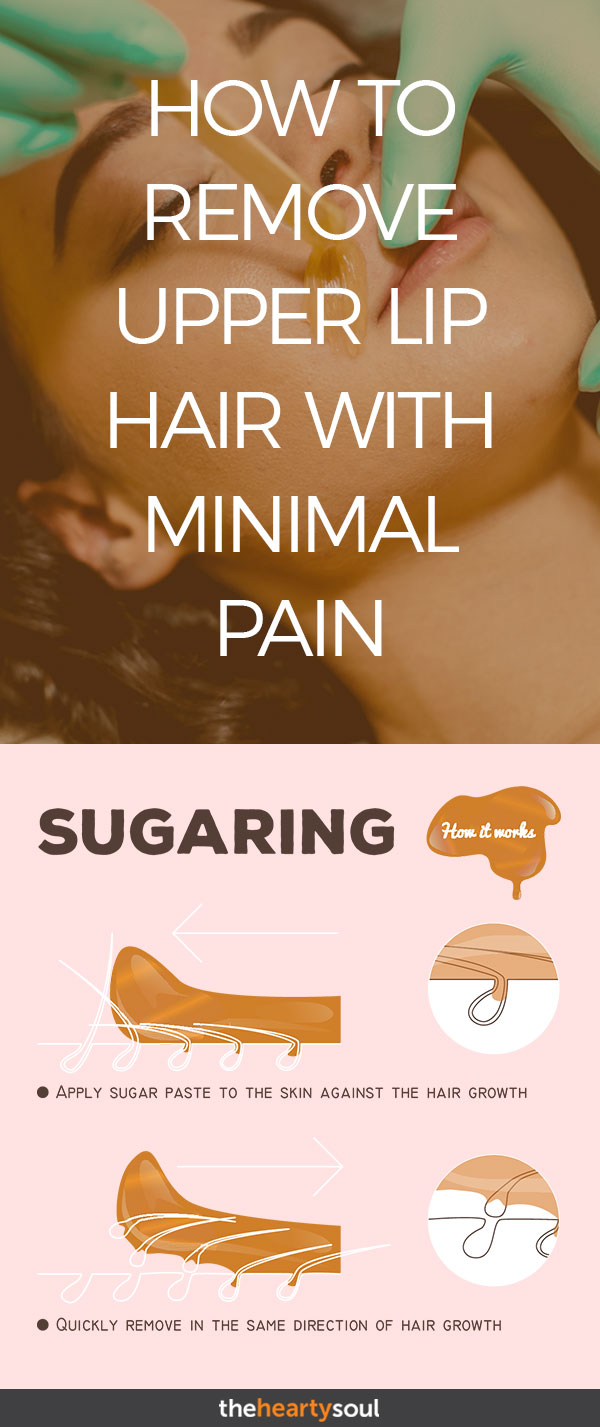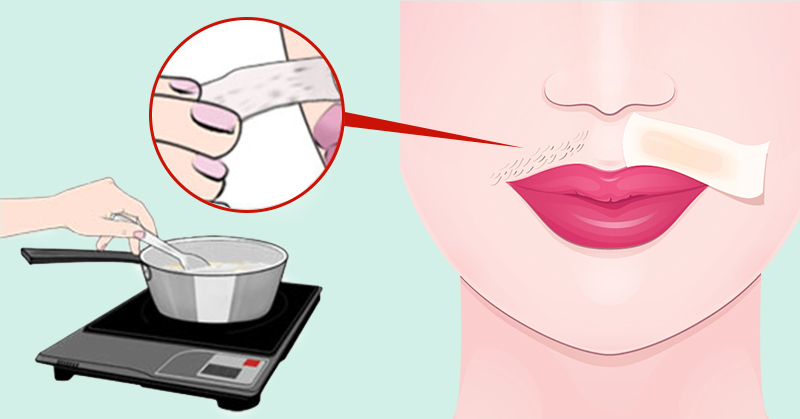When we picture upper lip hair, most of us picture the many mustaches that the men in our lives have had over the years. What many of us don’t think about is the upper lip hair that many women deal with themselves on a regular basis. Though all women have extremely fine hairs above their lips that are undetectable to the eye, there are plenty of women who struggle with visible lip hair and “female mustaches”. There are several reasons why a woman may begin to develop a more prominent ‘stache, and thankfully, there are several options to get rid of them.
Why Women Get Mustaches
There are several reasons why women may grow unwanted facial hair, also known as Hirsutism. This occurs when women have higher levels of androgens, the male hormones, in their bodies. Genetics, ethnicity, medications, as well as certain health conditions can also play a role. (1)
1. Hormonal Imbalances
Most of the hormone imbalances associated with hirsutism are adrenal gland disorders. Your adrenal glands, which are positioned above your kidneys, are the glands responsible for hormone production. When they aren’t functioning properly, your hormones will become off balance. Conditions that can cause problems with your adrenal glands include: (1)
- Cushing’s Disease
- Congenital adrenal hyperplasia
- Adrenal Tumors
- Adrenal Cancer
There are several symptoms of these disorders, including excess weight in the upper body, fatigue and weakness, headaches, high blood pressure, and high or low blood sugar. If you suspect you have an adrenal gland disorder, see your doctor right away. (1)
2. Polycystic Ovarian Syndrome (PCOS)
PCOS is one of the number one causes of hirsutism in women. It is a hormonal disorder characterized by infrequent or prolonged periods, follicles on the ovaries, excess male hormones, and the failure to ovulate. (1, 2) The exact cause of PCOS is currently unknown, however there are several symptoms to watch out for, including: (1, 2)
- Irregular periods
- Excess androgens
- Polycystic (enlarged and follicle-covered) ovaries
- Infertility
- Fatigue
- Mood changes
- Pelvic pain
- Headaches
- Moderate to severe acne
- Sleep problems
Again, if you suspect you may have PCOS, visit your doctor.
3. Medications
Certain medications can cause excess androgens and promote unwanted hair growth. People who take drugs such as anabolic steroids and testosterone, cyclosporine, and minoxidil commonly experience male pattern hair growth. (1)
If you are on any of these drugs, do not go off of them without first speaking with your doctor.
4. Ethnicity and Genetics
Women of Middle Eastern, South Asian, and Mediterranean decent are more likely to experience facial and male-pattern hair growth than other ethnic groups, though the reason behind this is unknown. If your female relatives, even a sister or an aunt, experiences hirsutism, then chances are so will you. (1)
While usually excessive hair growth is not something to be overly concerned about, you may still wish to talk to your doctor or health care practitioner to ensure you aren’t missing any of these more serious conditions.
Of course, priority should be ensuring you don’t have any of these conditions and taking the necessary steps to balance out your hormones and solve the real problem. In the meantime, however, you probably don’t want to be walking around with a mustache! Often you will hear about women who get waxed or threading done to remove upper lip hair, however this can be both costly and quite painful. Thankfully, there are much easier, less painful ways to get rid of the unwanted hair.
How to Get Rid of Unwanted Upper Lip Hair
There are several natural, much easier methods for removing upper lip hair, many of which you can do on your own at home. Here are a few of our favorites.
1. Sugaring
Sugaring was practiced as far back as the ancient Egyptians, and has been used in other parts of the world for a long time. It has only been slowly gaining traction in the Western world in the last couple of decades as a more natural, safer approach to facial hair removal than waxing or others. (3)
Your typical sugaring paste is made of sugar, lemon, and water, though some will add natural honey to their mixture as well. (3)
How to Make your Own Sugar Paste:
Follow the video below to make your own sugar paste.
How to Sugar At-Home:
- Prepare your skin by washing your face thoroughly and don’t moisturize afterwards.
- Gently rub a dusting of cornstarch or baby powder into your skin to help the sugar mixture grab the hair and not skin. Do not use too much, or it will interfere with hair removal.
- Take a small amount of your paste, which will be like a thick blob, and gently roll it into a ball. Make sure the paste is warm, not hot. The paste can be sticky, so you may want to consider using gloves for this part.
- Apply the paste to your upper lip in the opposite direction of hair growth. Use some pressure to pull and spread it across the area.
- Using your free hand, pull the skin so that it is nice and taught. Using a fast flicking motion with your hand and fingers, remove the paste in the same direction as hair growth. Remember, you are not pulling up, you are pulling the paste to the opposite side you started on. Continue until all the sugar is off. If you miss any hairs, you can use the same wax that is already in your hands to remove it.
- Rinse with soap and water and apply a cooling agent to the skin to reduce redness and any stinging. (4)
Pros:
- It can be performed at a salon by a professional if you don’t want to do it yourself.
- It’s natural, making it less likely to cause an allergic reaction and is more gentle on sensitive skin.
- It can be done more frequently as it is less irritating to the skin and can grab onto shorter hairs than wax can.
- It causes less breakage, irritation, and pain, because it is removed in the direction of hair growth rather than away from it.
- It attaches to the hair instead of the skin, making for a much less painful experience.
- Causes less redness as it does not remove the uppermost layer of skin.
Cons:
- If the mixture is too hot, it can burn the skin.
- If you have highly sensitive skin, you are more prone to redness and inflammation post-sugaring.
2. Gram Flour and Tumeric
Gram flour is hugely beneficial for you skin, especially for the skin on your face. There are many different ways to use it for hair removal, however our favorite is this one with turmeric. (5)
How to Use Gram Flour and Turmeric for Hair Removal
- Combine 2 tablespoons of gram flour with 1 tablespoon of turmeric.
- Add water slowly just until you have a thick paste.
- Steam open your pores and make sure the area is clean before applying.
- Apply it to your upper lip and let it sit for 20 minutes.
- When the time is up, wet your fingers and gently scrub it off.
- Rinse with clean water and pat to dry.
- Repeat 3 times each week.
Pros of Gram Flour and Turmeric:
- Gram flour exfoliates away dead skin, sebum, and oil.
- The texture of the flour allows it to hold onto the hairs and remove them from their roots.
- It clears pores and takes care of ingrown hairs while also removing the hair.
- Turmeric is anti-inflammatory, helping to keep redness and inflammation at bay.
Cons of Gram Flour:
- It has to be repeated 3 times a week.
- It can take time to show results.
- It can dry out the skin.
3. Gelatin
Gelatin is another excellent natural method for hair removal. (6)
How to Use Gelatin for Facial Hair Removal:
- Combine 1 tablespoon of unflavored gelatin, 1.5 tablespoons of milk or milk alternative, 1-2 drops of Lavender essential oil (optional).
- Once fully combined, microwave the mixture for 10-15 seconds so that it is warm (not hot).
- When the mixture is cool enough to touch, apply it to your upper lip using a Popsicle stick. Do this quickly before the mixture has a chance to harden too much.
- Allow the mixture to dry for a couple of minutes. Once it is fully dry, peel it off.
Pros of Using Gelatin:
- It’s cheap and accessible (can be purchased at any grocery store).
- It’s gentle on the skin, making it an excellent option for use on your face.
Cons of Using Gelatin:
- Not everyone finds it as effective as other methods and you may need to try it more than once to see results.
4. Egg Whites
An egg white mask is fantastic for not only removing unwanted facial hair, but also for removing black heads and other items that may be clogging your pores. (7)
How to Use Egg Whites to Remove Facial Hair:
- Whisk together 1 egg white with 1 tablespoon of sugar and a half tablespoon of corn four until it forms a paste.
- Apply the paste over your whole face and allow to dry (it will turn into a mask on your face).
- Once it is full dried, gently pull off the mask.
- Rinse your face and moisturize if necessary.
Pros to Using Egg Whites:
- It is a cheap, easy method in which all items can be purchased at the grocery store.
- It removes hair gently and with very little pain.
- It removes blackheads and other impurities at the same time, leaving behind soft, fresh skin.
Cons to Using Egg Whites:
- It may not be as effective for hair removal as other methods.
- You may have to do it a few times before you being to see results.
The Bottom Line
As you can see, there are several all-natural options for facial hair removal that don’t involve expensive and painful salon treatments. Try out one of these methods and let us know what works well for you.

Sources
- (1) Hirsutism. (2016, November 05). Retrieved September 22, 2017, from https://www.mayoclinic.org/diseases-conditions/hirsutism/home/ovc-20262990
- (2) Polycystic ovary syndrome (PCOS). (2017, August 29). Retrieved September 22, 2017, from https://www.mayoclinic.org/diseases-conditions/pcos/symptoms-causes/dxc-20342150
- (7) K. (2015, March 05). DIY ♥ Sugaring Wax Recipe and Tutorial. Retrieved September 22, 2017, from https://www.youtube.com/watch?v=GVKrLumCEpA

